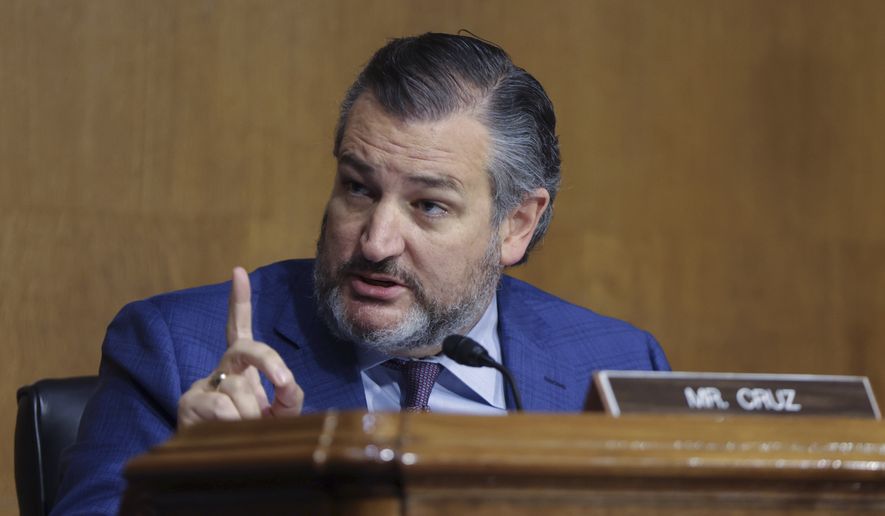Congress is barreling toward a brief government shutdown at the end of the week due to a rebellion against President Biden’s vaccine mandate by a group of Republican senators.
Five GOP lawmakers are threatening to use an arsenal of legislative procedures to delay consideration of a short-term funding bill unless it strips out funding to enforce the mandate. The senators hope to delay a vote until after Dec. 3 — the date by which Congress must pass a spending bill to keep the government open.
“I have long said that I am not particularly invested in the timing of a given vote,” said Sen. Ted Cruz, a Texas Republican who is backing the effort. “I think we should use the leverage we have to fight against what are illegal, unconstitutional and abusive mandates from a president and an administration that knows they are violating the law.”
Mr. Cruz and his allies know they do not have the votes to kill the spending bill outright in the evenly split Senate. At the moment, there are easily 10 GOP senators willing to join with all 50 Senate Democrats to break a filibuster and keep the government afloat.
Given that reality, the five GOP holdouts plan to use the Senate’s long-standing rules and precedents to their benefit. Within the chamber, unanimous consent is needed to expedite consideration of a bill, meaning that all 100 senators must agree on moving forward.
Generally, Senate leaders negotiate the number of amendments and time allotted for debate before unanimous consent is offered. If even one lawmaker opts to object, the process is sidelined and normal order must be followed.
The GOP rebels plan to do exactly that unless their demands are met by Senate Majority Leader Charles E. Schumer, New York Democrat.
“So as long as [Schumer] makes sure we don’t fund that unconstitutional mandate, we’ll be okay with unanimous consent,” said Sen. Roger Marshall, a Kansas Republican who is part of the group. “So it’s totally on his back.”
Provided the opposition holds, Mr. Schumer will have to wait at least two days to break a filibuster on the bill depending on its introduction. If the effort succeeds, which by all estimates it will, the Senate will then debate the legislation for at least 30 hours before a final vote.
The time frame puts lawmakers well past the Dec. 3 deadline, meaning the earliest the bill could pass would be over the weekend or next Monday. All of that is contingent upon whether the five Republicans use other procedural motions to prolong the debate.
“I support using every tool we have to protect the rights of Americans,” said Mr. Cruz.
The fight comes as Congress faces a long to-do list before Christmas. Apart from passing a funding bill by Dec. 3, lawmakers also have to raise the federal debt ceiling by next week.
On top of all that, the Senate is debating both a mammoth defense policy bill and weighs consideration of Mr. Biden’s $1.75 trillion social welfare bill.
Mr. Schumer, for his part, is not making the logjam any easier to resolve. The majority leader is refusing to concede the government funding bill cannot move via unanimous consent, despite the clock ticking down.
“I hope they see the light quickly and do not cause a needless Republican government shutdown,” said the majority leader. “If every member of this chamber used the threat of a shutdown to secure concessions on their own interests, that would lead to chaos for the millions and millions of Americans who rely on a functioning government.”
Mr. Schumer is engaged in back and forth negotiations with his Republican counterpart, Minority Leader Mitch McConnell of Kentucky, in hopes of breaking the logjam.
It remains to be seen whether a deal can be struck that will appease the five rebelling senators.
Mr. Marshall, a physician serving his first term in the Senate, said the group would relinquish its opposition if the funding bill specifically included language prohibiting the Occupational Safety and Health Administration (OSHA) from enforcing the vaccine mandate. He added such a provision could be added into the bill on the floor of the Senate using the amendment process.
For that compromise to be acceptable, argued Mr. Marshall, the amendment would have to pass by a simple majority, rather than the more conventional 60-vote threshold.
“I think at a minimum it deserves a 50-person vote,” he said. “The folks back home want to know how hard we’re fighting for them, that their jobs are just as important as keeping the federal government open.”
Mr. Schumer is unlikely to accept the simple-majority threshold since several moderate Democrats are expected to oppose the mandate. While the defections number fewer than 10, there would be enough to secure passage.
The amendment’s adoption would force Mr. Biden to choose between vetoing the bill and shutting down the government or having his vaccine mandate scuttled. The White House did not return requests for comment on this story.
For some GOP senators, the fight is one not worth undertaking. Many are wary of being burned politically by a government shutdown as has happened in the past.
Several Republican senators also question whether the timing is right given that ongoing legal challenges against the mandate have already blocked its implementation in various jurisdictions.
“I just don’t quite understand the strategy or the play of leverage for a mandate that’s been stayed by 10 courts,” said Sen. Kevin Cramer, a North Dakota Republican. “For all practical purposes, the mandates weaken every single day.”
For more information, visit The Washington Times COVID-19 resource page.
• Haris Alic can be reached at halic@washingtontimes.com.




Please read our comment policy before commenting.